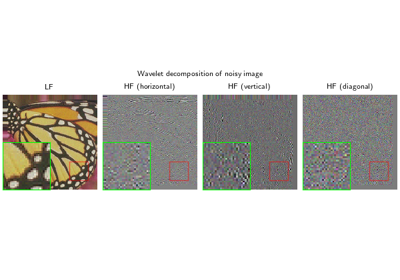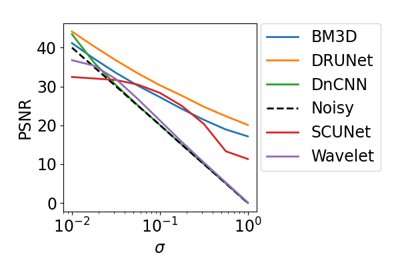Restormer#
- class deepinv.models.Restormer(in_channels=3, out_channels=3, dim=48, num_blocks=(4, 6, 6, 8), num_refinement_blocks=4, heads=(1, 2, 4, 8), ffn_expansion_factor=2.66, bias=False, LayerNorm_type='BiasFree', dual_pixel_task=False, pretrained='denoising', device=None)[source]#
Bases:
DenoiserRestormer denoiser network.
Model introduced by Zamir et al.[1], specialized in restoration tasks including deraining, single-image motion deblurring, defocus deblurring and image denoising for high-resolution images.
Code adapted from swz30/Restormer.
By default, the model is a denoising network with pretrained weights. For other tasks such as deraining, some arguments needs to be adapted.
- Parameters:
in_channels (int) – number of channels of the input.
out_channels (int) – number of channels of the output.
dim (int) – number of channels after the first conv operation (
in_channel, H, W) -> (dim, H, W).dimcorresponds toCin the figure.num_blocks (Sequence) – number of
TransformerBlockfor each level of scale in the encoder-decoder stage with a total of 4-level of scales.num_blocks = [L1, L2, L3, L4]with L1 ≤ L2 ≤ L3 ≤ L4.num_refinement_blocks (int) – number of
TransformerBlockin the refinement stage after the decoder stage. Corresponds toLrin the figure.heads (Sequence) – number of heads in
TransformerBlockfor each level of scale in the encoder-decoder stage and in the refinement stage. At same scale, allTransformerBlockhave the same number of heads. The number of heads for the refinement block isheads[0].ffn_expansion_factor (float) – corresponds to \(\eta\) in GDFN.
bias (bool) – Add bias or not in each of the Attention and Feedforward layers inside of the
TransformerBlock.LayerNorm_type (str) – Add bias or not in each of the LayerNorm inside of the
TransformerBlock.LayerNorm_type = 'BiasFree' / 'WithBias'.dual_pixel_task (bool) – Should be true if dual-pixel defocus deblurring is enabled, false for single-pixel deblurring and other tasks.
device (None, torch.device) – Instruct our module to be either on cpu or on gpu. Default to
None, which suggests working on cpu.pretrained (None, str) – Default to
'denoising'. Ifpretrained = 'denoising' / 'denoising_gray' / 'denoising_color' / 'denoising_real' / 'deraining' / 'defocus_deblurring', will download weights from the HuggingFace Hub. Ifpretrained = '\*.pth', will load weights from a local pth file.train (bool) – training or testing mode.
Note
To obtain good performance on a broad range of noise levels, even with limited noise levels during training, it is recommended to remove all additive constants by setting :
LayerNorm_type='BiasFree'andbias=False, as proposed by Mohan et al.[2].
- References:
- forward(x, sigma=None, **kwargs)[source]#
Run the denoiser on noisy image. The noise level is not used in this denoiser.
- Parameters:
x (torch.Tensor) – noisy image
- forward_restormer(x)[source]#
Run the Restormer network on the input image.
The input shape is expected to be divisible by 8.
- Parameters:
x (torch.Tensor) – input image
- is_standard_deblurring_network(in_channels, out_channels, dim, num_blocks, num_refinement_blocks, heads, ffn_expansion_factor, bias, LayerNorm_type, dual_pixel_task)[source]#
Check if model params are the params used to pre-trained the standard network for deblurring.



